#autofiction
Photo

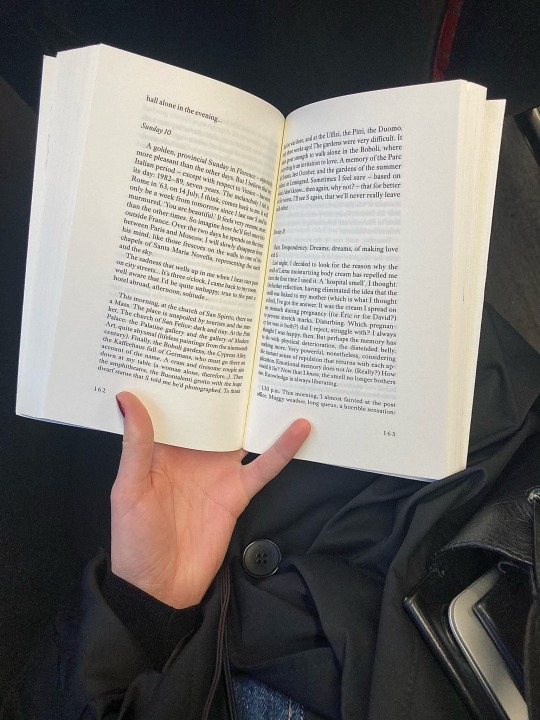
1st November 2022
Hi, I know I haven’t been here in ages! But I wanted to come back and tell you guys I finally picked up Annie Ernaux. I have devoured this and am now desperate to read Simple Passion immediately. I talk a bit about it in my first newsletter that I will discuss more later. In the mean time - how is everyone? Who else loves Annie Ernaux?
#journal#books#booklr#bookblr#litblr#fitzcarraldo editions#annie ernaux#simple passion#getting lost#autofiction#literature#academia#dark academia#light academia#study#studyblr#reading
517 notes
·
View notes
Text
" Vengo invitato come relatore a un convegno di tre giorni a Torino, un workshop internazionale con decine di partecipanti. Non conosco nessuno di questi colleghi, ma apprezzo la circostanza di un ambiente del tutto nuovo e di gente mai vista.
S. è morto da sei mesi.
Al ristorante dell’albergo dove si svolge il convegno i posti non sono assegnati e alla prima pausa per il pranzo mi ritrovo a dividere il tavolo con un relatore olandese, un afroamericano di Miami, una canadese, un belga, una brasiliana e un altro italiano, di Roma.
L’imbarazzo iniziale dura poco, ci troviamo a discorrere come se ci conoscessimo da mesi, amici di lunga data. La casualità che ci ha riunito allo stesso tavolo si trasforma all’istante in un legame. Finiamo per trascorrere insieme il resto di questi tre giorni. Il convegno, i pranzi, le cene, le serate fuori a bere nei bar della città.
Essere sconosciuto fra sconosciuti è rilassante, l’atmosfera di unità che si è venuta a creare fra noi, destinata a durare una finestra di tempo così limitata, ha qualcosa di magico. Ognuno di noi lo riconosce.
L’ultima notte del convegno faccio un sogno eccezionale.
Sono in un enorme luna-park e mi aggiro incuriosito fra le diverse attrazioni. Giungo a una giostra composta da una ruota orizzontale alla quale sono agganciate una serie di seggioline a due posti. Decido di salire e ne occupo una da solo. La giostra si mette in moto e dapprima gira piano, poi acquista velocità e comincia a piacermi parecchio. Anzi, mi dico che era tanto che non salivo su un’attrazione del genere e che avevo dimenticato quanto potessero essere divertenti. La velocità del carosello si fa vertiginosa, ormai non riesco neppure a intravedere i volti degli occupanti degli altri seggiolini, è tutto troppo frenetico e confuso, ma questa folle velocità invece di preoccuparmi mi fa ridere fino alle lacrime. Poi il mio seggiolino si stacca dal resto della giostra e comincia a schizzare verso il cielo. Non provo alcuna paura, al contrario ne sono estasiato. Sto volando incontro al cielo, il vento nei capelli, la terra che si allontana sotto di me, sto compiendo un viaggio imprevedibile ed è una sensazione stupenda. Con un’improvvisa intuizione razionale mi rendo conto che sono felice, felice come non ero da mesi. Ed è a quel punto che accade: sento la voce di S. al mio fianco, che nell’orecchio mi sussurra: “Questa felicità è il mio regalo. Buon compleanno”.
Mi risveglio all’istante.
È la mattina del 18 aprile: me ne ero dimenticato, ma è il mio compleanno.
Questa felicità è il mio regalo.
A oggi è il sogno più bello che abbia mai fatto. "
Matteo B. Bianchi, La vita di chi resta, Mondadori, 2023¹; pp. 144-145.
#Matteo B. Bianchi#letture#leggere#felicità#sognare#sogni#La vita di chi resta#ricordi#amore#dolore#libri#lacrime#citazioni letterarie#compleanno#giostre#regali#sconosciuti#letteratura contemporanea#estranei#visioni#gioia#Torino#scrittori italiani#autofiction#inconscio#psicoanalisi#vita#amicizia#affetto#simpatia
11 notes
·
View notes
Text
The harrowing beauty and brevity of these books and their apparent simplicity disguised somewhat the punishing cost of their honesty. Never had I seen the supposed freedom — the “narcissism,” as we now like to call it — of self-examination so exposed in its brutality. Ernaux grasped the depths of isolation and loss she would need to descend to in order to retrieve the original reality of her being. Her art bears no relation to a privileging of personal experience; on the contrary, it is almost a self-violation.
—Rachel Cusk on the work or Annie Ernaux
58 notes
·
View notes
Text
AGAINST AUTOTHEORY aka THEORY TEXT AS WILLING DILDO
As this confluence with autofiction illustrates, the reduction of theory’s mediations down to amiable oozing incorporates the niche of academic knowledge production into the booming personalist genre industry. Moreover, autotheory comports as dexterous academic labor, projecting a fantasy that courting extra-mural audiences can make up for downsizing in the intellectual professions. Its vulnerability enkindles senior academics bored of theory’s many funerals, imagining eager readerships in a great beyond, and ignites younger academics searching for openings in an economic and professional landscape of foreboding foreclosure; its elasticity bodes a space for young academics to create work and find recognition even though the university as an institution has largely expelled them. Gigification of academic labor crams academic production: manifest your individual take in your individual style with this short-term teaching contract here, this Substack subscriber there. In this way, autotheory must be seen as efflux of a context in which theorists with fair labor conditions like tenure encounter their dire lack of peer audience, and theorists without fair labor conditions hustle for crossover appeal to eke out a living.
Aphoristic form props many of these texts thanks to its elliptical dance of vaporescence and glut, simultaneously pausing and flowing, at once crystal and aporia, snubbing and solicitous. They disrupt linearity, argumentative progression, and academic citation, boarding tiny theses absent plodding hallways. Pushing prose poems like other writers in the literary milieu, these genre melds are charming, accessible. We are drawn out of the realm of abstraction and solicited into a lyrical presence, a seductive proximity that subtracts the medium of theory’s abstractions and generalizations, achieving immersion. Reclining into life-writing, recoiling from argumentation, such retreats attain great resonance and beauty even as they whittle away theory’s distinct value, and recode theoretical knowing from revelatory to idiosyncratic. Immediatist theories posit a smooth continuum of body–experience–knowledge; bolster reflexive, passionate attachments as more legitimate than reason; refuse “symptomatic reading” in order to immanentize content. “It is what it is,” immediacy theory incants.
Such frolicking provocative insurgence of sensuous stimulation against linguistic or conceptual sense erects the theory text as willing dildo. It is bold in its shedding of academic composure, compelling in its self-disclosure, and titillating in its seductive posture—although decidedly unsexy. These are acute and perhaps even vulnerable performances, insuring in advance that assessing them critically would amount to some kind of mean violation—and that seems indeed to be the very point: to be so effulgently bare and corporeally vivid as to preclude distance-taking or concept-making. Immediacy as the unambiguous transmission of affect from author to reader, autonomic responses imagined untainted by the symbolic.
— Anna Kornbluh, from Immediacy
14 notes
·
View notes
Text


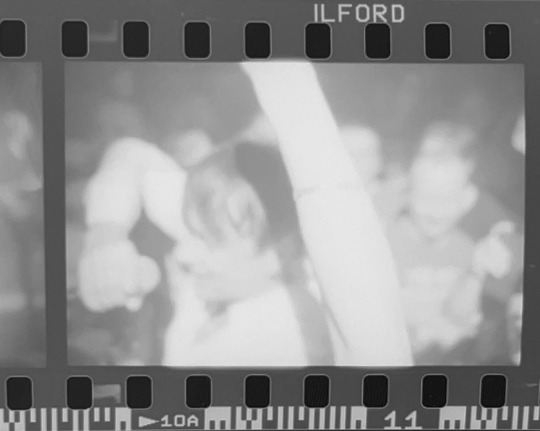

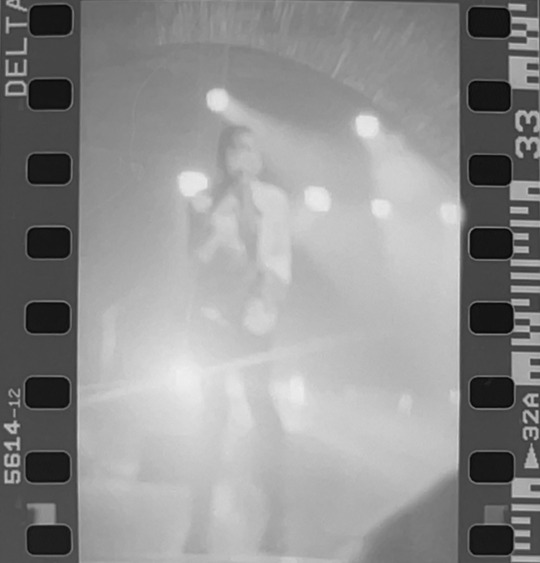
#suede#autofiction#live#the engine shed lincoln#2023#my pics#olympus trip 35#b&w#blurry because camera is fucked#shadow self
11 notes
·
View notes
Text

I'm officially in my Brett Anderson era and I'm going to draw this man again...
song inspiration: Suede - "That Boy on the Stage"
#tkapranosart#brett anderson#suede#suede band#britpop#autofiction#london suede#my art#digital art#digital drawing
43 notes
·
View notes
Text
first entry. stayed up all night last night after we went to see poor things — I love Chris so much and it’s such a powerful joy to spend time with him — and I felt ebullient and excited and a little bit ready to cry at everything. Not in frustrated despair. Body hurts from when I ate shit walkin off the the highway curb thing after getting mildly mugged by a salesman. im anxious about all the usual shit money it’s money it’s money. Can I still call Hannah? I know why I sabotaged it. Trash and shit all over my room, no space elsewhere, always got half a job and mostly a not job. I’m excited to play a show and do a standy up set. I have been thinking again that yes obviously I should pick back up on the backlog YT series where it left off, if 3 poorly edited bad sound quality ones can get some friends and friend diaspora and a tiny chunk of extradiasporic money from the patreon surely a better version can get more. All I fuckin wanna do is whatever I like to do. Not I’m lazy but I’m good at it, and I’m not good at most things.
Kyle and I talk. I’m worried about him I mean deeply but it felt extraordinary to be able to have a real and non bullshit connection, two dudes unguarded, tears, sharing heartbreak sharing fears about using and losing. Kyle is a gem, he is a fuckup like me and he’s fucked things up for other people and he knows it, hes fucked me over too, but I can feel in his voice when we talk that we are trapped in the same kind of thing. I don’t have a clue what to do to help which is disturbing to me always. Tomorrow will feel shitty obviously. No sleep, 8 hour debt. But it will be good, I will make it so. Today walking around I felt I could walk around in a Cool way. Like I had it, I could have it, I could have it like it was Wilson when they said “I found you intimidating you were so cool.” Caroline—eh. Ah, maybe another night. I’m on a kick of just unabashed enjoying listening to the misfits all the time like a fuckn child, which means something, and I hope I can MaNifest it to mean something good
I await Sara’s party breathlessly. I wish it were just for me. When can I have her ear when can I have her entirely for long moments and nights
drawings are by Nick Blinko the incredible horror vacui artist, schizophrenic guy, singer of the underrated menacing genius Rudimentary Peni



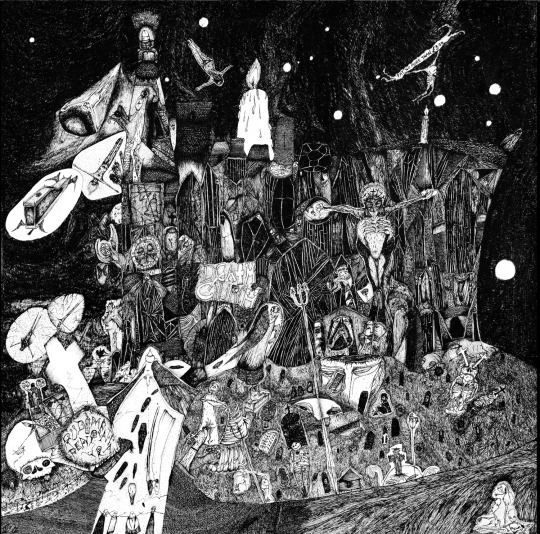
#autofiction#personal diary#a stranger#I am ilja as far as you know at least#nick blinko#personal#Spotify
3 notes
·
View notes
Text
Dandelion Daughter by Gabrielle Boulianne-Tremblay
goodreads

Dandelion Daughter is an intimate, courageous portrait of what it’s like to grow up having been assigned the wrong sex at birth. Set against the windswept countryside of the remote Charlevoix region some five hours north of Montreal, Gabrielle Boulianne-Tremblay’s autobiographical novel immortalizes her early years as an alienated boy trapped in a world of small-town values and her parents’ dissolving marriage, through complex adolescent years of self-discovery and first loves, to the harrowing episodes that fuel the growing realization that she must transition and give birth to her new self if she is to continue living at all.
Mod opinion: I hadn't heard of this novel before, but it sounds interesting.
#dandelion daughter#gabrielle boulianne-tremblay#polls#trans books#trans lit#trans literature#lgbt books#lgbt lit#lgbt literature#contemporary fiction#to read#suicide tw#(kiiiinda implied)#memoir#autofiction
4 notes
·
View notes
Text

An older trans woman once told me that she sits to pee, which occasionally results in her peeing on herself, because that’s how hard she’s worked to block out the fact that she’s still retained her original organ all of these years. That’s what girls do: we deal in affect–feelings, vibes, emotions, moods—to counteract dissonance. If you feel like a girl, you are a girl. Serving cunt is the law of assumption. Pussy-stunting is a mindset. Delusion is a lifestyle. And dissociation is effortless, unselfconscious, easy.
After white men, only white women and girls are afforded an unstudied ease, a universalizing, pedestalizing canvas-like blankness free of aesthetic assumptions, charged with authority and unburdened by race and gender. The rest of us are seen as open wounds. I used to try to fight how I am perceived by feigning a sense of aloofness, insouciance and smallness. I did so by tucking my hair behind my ear, wistfully, longingly staring off into the distance, dissociating from my body to temporarily transport to a place where I could write like a white girl.
I would conjure the white girl vibe instantaneously when I’d listen to music, especially if the music I am listening to is really loud, almost dulling my other senses and causing me to feel what can only be described as the opposite of embodied: void-like. There, I could exist as an empty, diaphanous vessel unfilled by anything at all. There’s no burden of “identity” in the club or the bedroom or the hammam or the garden or online as the avatar of your choosing–anywhere deemed a feminine space worth inhabiting. Online, especially, is where anyone can lay down their burdens—the thick coating of class and race, geography and gender–and escape the indignities of womanhood, blackness, otherness. No fat…no trauma…no spiritual heaviness…no intensity…only purity. A blank canvas no one can ascribe assumptions and project onto. You’re the default player in the game. A babygirl.
As a terminally concerned girl teeming with big, electrical emotions, presenting myself as an open wound–where the id is steering the ship despite societal expectations and pressures to the contrary to flatten and suppress– has never quite appealed to me because I know it doesn’t appeal much to anyone else. I think of myself in relation to others, in a sort of triangulation with the world. I don’t want to be a spectacle, if I can help it, because I know I already am, that there is an audience baked into my experience, mercilessly ascribing the same assumptions to me that they would someone engaging with hallucinations on a city bus. On a city bus, to witness someone mumbling to themselves, smiling exuberantly, screaming, singing terribly or sobbing loudly in public, is to have a front row seat to an undesired excess, intensity and earnestness. That person has unconsciously chosen to present themselves, to the subtly disciplinary gaze of surveilling strangers, like a spectacle to be gawked at. They’ve interrupted the homogenizing edicts of polite society in a manner considered vulnerable, neurotic, unusual, boundaryless, histrionic, unrefined, unserious, grotesque, eccentric, amoral, out of control, shameless and cringe-worthy. Their vivid displays of animatedness, too gauche for “normal” sensibilities, so we’d rather tuck them away like an unsightly pile of rags on the floor, undermining them like we do our own id in the company of others.
This image is commonly associated with the mentally ill and the homeless, whom the public bodies and perceptions of are heavily policed and politicized. States of animatedness, of excess, are also racialized and gendered. Femininity and blackness, its sincerest expressions, deemed maximalist, evidence of effort, and therefore, failure. Too much.
To transcend our animatedness, we must turn our disciplining gaze to ourselves, self-effacing to make space for whiteness and maleness, totally erase ourselves. This palimpsestic quality is achieved through minimalist attire (no garish, colorful clothes re: avant basic), eliminating girlish and black vocal tics, adapting middlebrow tastes, writing in 3rd person, muting one’s melanated state with black and white photography, aspirational thinness so there is less of you, and an attitude that communicates aloofness so severe that you don’t even care about yourself.
These attempts at minimization, of disciplining your public animated body, will allow you to enjoy a certain remove from the wider world. You’ll be cured, no longer teeming with niggerishness and schlepping the mantle of womanhood into every room you walk into for the rest of your life. You’ll be the babygirl again, who you were before you ever knew that you occupy a subordinate role in society, and before you were privy to the myths and ideologies that have been created around your image and identity.
Like a princess, your girlhood and daughterhood had a sense of prestige, making the fact of your consanguinity almost secondary, except as a matter of differentiation from the masses of non-princesses. There wasn’t yet a force larger than life requiring self-minimization as a necessary boon. You were presumed to be a pure, guileless blank canvas of a girl. You didn’t have to arm yourself with knowledge of that—or any truth—to feel a claim to safety and purity because the fact of it was informed by your singularity.
The babygirl, elegantly inert and slow, never had to run outside of the context of a freewheeling and uninterrupted playtime. She was never embarrassed into velocity. She never had to be strong or work hard. She’s never had to learn to self-preserve because her existence hadn’t called for that skill set. Self-preservation is the ministry of wounded girls. The babygirl has never been wounded.
The babygirl is light, buoyant with a feeling she belongs right where she is. She’s preternaturally interested and keenly aware, with an insatiable attention and curiosity for entertainment, her commodities, the objects in her bedroom. She prefers living in a rapt state, the romantic eye of her mind transporting her from her present surroundings and the inherent ennui of girlhood into her imagination.
The babygirl’s emotions don’t give the appearance of an overflowing volcano of lava curdling into evidence of effort and maintenance and failure and toxicity, clumps for other people to step over, ignore, forget, apply a disciplining gaze to. She is like the waves in the ocean crashing freely into each other, free to express the gamut of her emotions, whether sad, irritable, annoyed or enraged, without it sweeping up the rest of her image and identity until there’s nothing left of her but her feelings, in the unforgiving, cynical eyes of the strangers she will meet in the world who will, inevitably, only see animatedness.
What makes me a babygirl–and what unifies me with all the other babygirls online who’re so hotly debated and contested and disbelieved–is our sensitivity and an unrelenting over-identification with objects and other people. Babygirls are committed to the aesthetic reading and viewing of still images, films and the internet, which informs a girly canon of derealization ephemera not intended to be over-identified with: antiheroines, dreams, the moon, theory, book spines, social outcasts, fonts, hysterical and ribald women, “invalid” women who live in their beds, dolls, numbers, voids, the color pink, avatars on social media, God.
All that is ostensibly facile and self-explanatory, for the babygirl, is gleaned through persistent observation. The babygirl fills emptiness with a divine estuary from which an embodied and pillow-soft love audaciously converges with nature’s brutal architecture—pulsating alive with blood and flesh.
Being a babygirl is like the infinitude of the world contained in a pop song or the gaze of someone staring down the barrel of a gun; it stretches on and on forever. Anyone, then, who sees through people like they are vacant homes waiting to be occupied by her, who thinks they know others with the cultic conviction of a true believer, who is wildly and wholeheartedly alert, is a babygirl.
And I am Princess Babygirl.
I am novelty combined with appropriation like collage art, music sampling and recipes. My palimpsest quality is not an encryption of the self; but rather, an illuminating synthesis of my embodied experience. I have been the host to various narratives, epistemes, connections and dreams that I’ve neither fully abandoned nor refined. I’ve imprinted my affects and vibes forever–going on and on like the perfect pop song on repeat–so I can never be erased. Princess Babygirl is who I was before all of the sublimated tensions, marketplace competitions, traumas, vulnerabilities, anxieties, mimetic rivalries, delusions, dreams and violence of womanhood happened to me.
As Carl Jung foretold in his writings on the Age of Aquarius, human consciousness is moving toward a more feminine-centric paradigm. I want to represent the metamodern conditions of this moment in a blend of identity-critical autotheory and audiovisual stimuli exploring affects, aesthetics, taste, psychology, consumerism, the performance of womanhood and modern femininity.
#girls#girlhood#womanhood#gynocriticism#self-optimized girl#identity#cultural criticism#identity politics#girlblogger#writers#substack#vibes#affect theory#collage art#maximalism#minimalism#taste#aesthetics#princess babygirl#babygirl#princessbabygirlforever#autotheory#autofiction#esoteric#femininity#modern femininity#feminism#femcels#it girls#otessa moshfegh
2 notes
·
View notes
Note
Would you consider some of Dostojewskys works as "autofiction"?
I think some were drawn from autobiographical experience, and I also think Notes from Underground, while not directly autobiographical, influenced autofiction and other precursor novels to autofiction (Hunger, Nausea, The Stranger) in its confessional form and emphasis on social alienation. The term "autofiction," strictly speaking, dates from the late 20th century, so it would be anachronistic, if that matters, to apply it directly to him.
3 notes
·
View notes
Text
Dysphoria
She sits, she stands, she walks. She does all the things that life demands, except those she can't, yet she does not feel alive. She would, perhaps, feel more human if she wasn't cursed to be undone.
It started three years ago. She hadn't showered in days. When she finally looked in the mirror, she saw straight through herself. All the way to the back wall. A shower was enough to bring her back.
Every morning since, she found she'd been undone a little over the night. Her morning ritual seemed to bring her back, but never fully.
One day she will be gone.
For a while, the unbecoming stopped. It stopped while she was AWAY. A lot changed while she was AWAY. She'd found love for herself and from others.
But now she was not AWAY. She was HERE. HERE she was alone, and her self-love became a fickle force. Love from others exists HERE only in name. HERE people cannot love.
So now she is undone. She is undone at night while she sleeps. She is undone during the day. She tries to stop it, to come back with her ritual. It doesn't help. She is undone faster.
Today she sits downtown. She is watching other girls from HERE. They travel in pairs and laugh in threes. They see each other. She wonders if they become undone too. She wonders why they can stay present HERE.
Maybe you have to be from HERE. HERE has to run in your veins. She is HERE, but she is still AWAY. Far away.
She knows what she wants. what she needs. But there's no one who can see her. HERE everyone is blind.
2 notes
·
View notes
Text
on the train journey home from visiting the town i spent 4 infuriating years going to secondary school in. hadn’t been back once since late 2019. still feels like a casual visit to hell. the most horrific part of it all? nothing there’s changed, at all, apart from maybe a few shopfronts. the toy store’s still in the same place, the coffeeshops all in their rightful order, the traffic lights in the familiar spots and gaggles of schoolgirls standing chatting along the pavements in the same uniform they’d — we’d — worn all those infinite lifetimes ago.
five years isn’t a lot, but a lot can happen in five years. a lot of reconsideration and reconciliation and forgetting. forgiveness, maybe, because holding a grudge against your teachers and peers back from when you were all a bunch of spoiled kids is an exercise in futility.
still found myself stepping warily and with caution as i approached the school building itself, the black tiling of its roofs looming over the little street. too genre aware for a character in a realist story, i half expected to slip through some unseen crack in time and find myself face-to-face with my awkward, dishevelled younger self, her uneven pigtails and tangled wire headphones, her too-long pleated skirt and ungainly walk, probably trailing on the sidewalk behind two friends, firmly deluding herself into believing that she’s part of an indivisible ‘trio’.
but i must have missed her. must have arrived too late. didn’t get the chance to hug her and tell her, “nothing’s wrong with you. it doesn’t get better for us, not really, but we make do, find new ways to deal with the fact that we’ll never be quite seen as human by the people around us. in my time — you still don’t have many true friends, you still dream of escape, still fictionalise and romanticise the everyday to cope with the knowledge that there’s no-one coming to save us. but we survive. we live. the future’s still ahead of us and there will be many beautiful moments. that’s what’s important, so keep holding on to that hope, baby”. and then she’d yell at me or hit me and run away to catch up with her “friends”, loudly complaining about “that crazy bitch back there” to impress them
but none of that happened. no temporal gaps, no magic, no horror. no ghosts but the ones that refuse to come out yet hide in every dark corner. haunting the sports field. the chapel. the benches in assembly hall. beckoning into a cursed past you never want to revisit.
i ran as fast as my legs could take me. sprinted all the way down the shadowed footpath back to the station to take me away. and i swear i could hear cruel laughter follow
#guess this place is just my public diary now#jamie.txt#autofiction#kinda??#haunting#ghosts#autism#autistic childhood#actually autistic#bullying
4 notes
·
View notes
Text
" Durante un weekend a Roma eravamo stati invitati, insieme a un’altra mezza dozzina di persone, a cena da un mio amico, scrittore affermato, finalista allo Strega, un nome in voga tanto nei salotti culturali che in quelli politici. Si era da poco trasferito a Monti e ha voluto farci fare una visita guidata del nuovo appartamento, attraversando stanze dagli alti soffitti affrescati con librerie che occupavano intere pareti e quadri di pittori contemporanei nei corridoi. Nel corso del tour S. si è acceso una sigaretta, senza chiedergli il permesso. Lui l’ha fulminato con lo sguardo e gli ha intimato di fumarla su un balcone. Per prossimità sentimentale il suo biasimo sembrava riguardare anche me, sebbene io abbia finto di non coglierlo, mostrandomi indifferente al pallido incidente diplomatico. Ho lasciato che S. terminasse la sua sigaretta da solo affacciato sul panorama delle terrazze romane.
Pochi minuti più tardi, nel corso dell’aperitivo, il nostro ospite si scusava per l’assenza di acqua calda in casa, spiegandoci che la caldaia era guasta e il tecnico che aveva promesso di passare a ripararla aveva spostato l’appuntamento al mattino seguente. Mentre noi sorseggiavamo i nostri drink, S. si è alzato dalla sua poltrona e gli ha chiesto di mostrargli dove fosse collocato l’impianto. Lui l’ha condotto in cucina. Ho sentito S. domandargli: «Hai mica un cacciavite?».
Un quarto d’ora dopo la caldaia era di nuovo funzionante e il celebre scrittore guardava il mio compagno con l’ammirazione che si riserva ai genî incompresi.
Adesso mi godevo il plauso che la prossimità sentimentale mi aveva fruttato. S. invece era tornato a bere il suo cocktail, indifferente all’elogio come lo era stato al rimprovero precedente.
Le convenzioni sociali non sono mai state una sua priorità. "
Matteo B. Bianchi, La vita di chi resta, Mondadori, 2023¹; pp. 115-116.
#Matteo B. Bianchi#letture#leggere#classismo#biblioteche#quartiere Monti#snobismo#alterigia#autofiction#spocchia#La vita di chi resta#ricordi#maleducazione#snob#estranei#letteratura contemporanea#sconosciuti#scrittori italiani#vita#citazioni letterarie#premio Strega#Roma#albagia#superbia#turris eburnea#libri#vanità#vanagloria#presunzione#boria
14 notes
·
View notes
Text
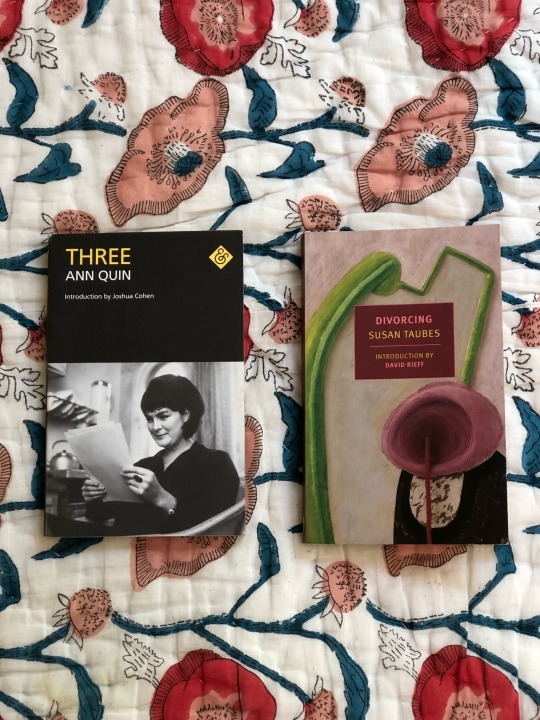
I’ve recently read Ann Quin’s Three and Susan Taubes’s Divorcing—two absolutely brutal experimental novels by 20th-century “metabolizers of misogyny” who committed suicide (to borrow a phrase a reader once used to describe Alejandra Pizarnik and Amelia Rosselli). You will often hear hackneyed literary critics and intellectual blowhards utter platitudes like “experimentation with the novel as a form ended with Proust” (swap Proust with Joyce—same sentiment). These books lay bare the vacuousness of such claims, for there was no shortage of experimentation with form during the postwar period. It’s just that books like Three and Divorcing passed quickly into oblivion and found no readership after their suicides. Of course there’s a double standard at play here: experimentation by men is a mark of genius, whereas with women it represents incoherence or incapacity—an inability to deal straightforwardly with plot, character, setting, etc, rather than a conscious rejection of those formal conventions.
Perhaps one day I will teach a class on water suicides as a kind of sequel to my Water and the Imagination class…
38 notes
·
View notes
Text
Field of Lucid Dreams
Because I had a hard time getting my novel picked up, I decided to publish my short stories — my collection of coincidences — as a blog, hoping I would gain some traction that way. And before I even wrote a single post, a series of events proved this was the right choice.
At the library where I work, a book came across my desk, called Proof of Heaven, which was about a neurosurgeon who has a near-death experience and describes his vision of the afterlife. It was inside a box full of donated books. I stacked the donations on a cart to shelve them when Sarah, one of my colleagues, stopped me.
“Got one more for you,” she said. She handed me a picture book called Holly, which had a black cat on the cover.
As I filed away the books, I picked up Proof of Heaven and flipped through it. I found a withered prayer card tucked in the book, on page 24; someone must have used as it as a bookmark and forgot about it. I opened the card with one hand, while holding the book open with the other, and one word on the page, from this passage, happened to catch my eye.
Then, out of nowhere, I shouted three words. They were crystal clear, and heard by all the doctors and nurses present, as well as by Holley, who stood a few paces away, just on the other side of the curtain.
“God, help me!”
Holley.
Sarah had just handed me a book called — Holly. I put down Proof of Heaven and picked up Holly, and the first sentence said that last November, we lost our 14-year-old cat named Holly.
That was when Marianne came to mind. Marianne’s birthday was on November 14th. Her father died last year, after a long, grueling illness.
Instead of putting Proof of Heaven on the shelf, I kept it aside for her.
She texted me a few days later: “So I guess I have to read that book now. Last night, this lady at work mentioned that baseball movie, Field of Dreams. Later, I watched this YouTube video, and it mentioned Field of Dreams too. The crazy thing is that the video was about near-death experiences — just like the book.”
“Holy shit!” I wrote.
When I thought about Field of Dreams, I remembered this strange this little episode that took place the night before.
“Here’s another baseball coincidence for you,” I wrote. “Last night I was at Pita Land getting shawarma. I was standing in line, watching TV, and a headline flashed across the screen: ‘Jays sign new infielder Isiah Kiner-Falefa’. But I caught it so quickly that I could have sworn it said infidel, not infielder. I stood by the TV, waiting for the headline to loop back around, so I could see what it actually said. And his name sounded just like what was on the menu — Falafel.”
She sent me a laughing emoji.
“It’s interesting,” she went on. “I never get any signs from my dad, and I want one so badly.”
A few days later, it was New Year’s Eve, and I spent the night at Robb’s place. At one point, he put on the new Dave Chappelle Netflix special: The Dreamer.
Thinking about Field of Dreams, I listened to his monologue, my eyes fixed on the screen.
In your life, at any given moment, the strongest dream in that moment wins that moment. I am a very powerful dreamer. I dreamed tonight as a fourteen-year-old boy, and I’m living it as a fifty-year-old man…
This gave me such a renewed sense of determination to publish my collection of coincidences online. Even if no publisher in the world wanted my book, I would still chase my dream.
And so, the next day, I set out to write my first blog post. I closed my eyes and waited for an idea to come to me. My thoughts went back to Pita Land, and I remembered how on that morning, at work, a bunch of us were talking about obscure horror movies; someone had brought up a documentary about the Donner Party, the group of American pioneers who were trapped in the Sierra Nevada mountains and resorted to cannibalism to survive. Now, just before I saw the headline about Kiner-Falefa, I noticed — for the first time in all the years I’d been eating shawarma — one particular item on the menu: Beef Doner.
With a shudder, I started jotting all this down, wondering how I would string this together into a something worth reading. At first, I couldn’t figure it out, and so I took a break. With obscure horror movies on my mind, I started scrolling through YouTube, looking for something to watch. Then I found a channel called Renegade Films.
At random, I clicked a video called “Who Let Him Make This Movie?”. The movie, which I knew nothing about, was Babylon. As it turned out, much to my delight, Babylon was directed by Damien Chazelle — whose name echoed Dave Chappelle.
When it was over, another video on the channel, right next to the one about Babylon, caught my attention: “The Perfectly Logical Reason This Director Ate His Shoe (inspiring)”.
The director was Werner Herzog. It was about the time Herzog promised Errol Morris he would eat his shoe if he finished a movie about pet cemeteries he was working on. And, as I later read on Wikipedia, “In 1978, when the film Gates of Heaven premiered, Herzog cooked and publicly ate his shoe.”
Pet Cemeteries. Holly. The lost cat. Proof of Heaven. Gates of Heaven.
In other words, the perfectly logical reason this director ate his shoe was so that it would serve as a call to fearlessly chase your dreams. He said:
If I abandon this project, I would be a man without dreams, and I don’t want to live like that. I live my life, or I end my life with this project. All these dreams are yours as well… we have to articulate ourselves otherwise we would be cows in the field.
Field of Dreams.
My head was spinning. Finally, I read the Wikipedia page on Field of Dreams. And the first paragraph absolutely blew me away. Field of Dreams was based on a novel by W.P Kinsella called — Shoeless Joe.
The Perfectly Logical Reason This Director Ate His Shoe.
Frantically, I kept clicking all the links on Wikipedia, writing down all the connections I found — including the fact W.P Kinsella wrote a book called Butterfly Winter, Proof of Heaven had a blue butterfly on its cover, and Werner Herzog directed a movie called Fitzcarraldo, about a man determined to transport a steamship over a hill in the Amazon basin in order to build an opera house.
Field of Dreams gave us the phrase, “If you build it, they will come.”
If you build your website…
– they will come.
Finally, I jumped back to the Wikipedia page for Field of Dreams. In the movie, Ray, who was unable to reconcile with his father before he died, hears the ghost of “Shoeless” Joe Jackson tell him to build a baseball diamond in a cornfield. If you build it, they will come. Throughout the film, Ray sees the ghost of “Shoeless Joe” and other dead baseball players. Then, during a game, when the catcher removes his mask, Ray recognizes him as his father as a young man.
I stopped reading at that point, and I thought about something Dave Chappelle said:
You have to be wise enough to know when you’re living in your dream, and you have to be humble enough to accept when you’re in someone else’s…
All this time, I thought the coincidences were all about my writing, my blog — my dreams. But then I remembered what Marianne said about her father. And I knew I had to be humble enough to accept this wasn’t for me. It was for her.
#spirituality#spiritual disciplines#coincidence#mysticism#religion#motivation#personal development#personal drama#personal diary#novel writing#autofiction#literature#literary fiction#literary quotes#writing#literary agent#blog#blogger#lucid dreaming#psychology#psychonaut
2 notes
·
View notes





